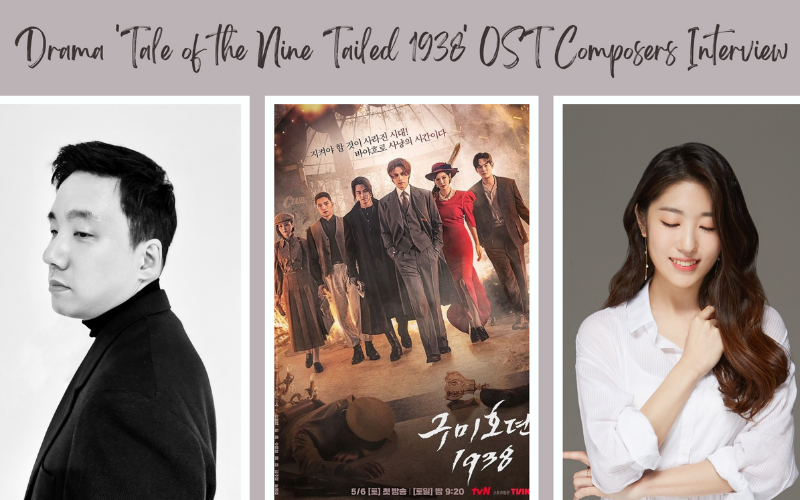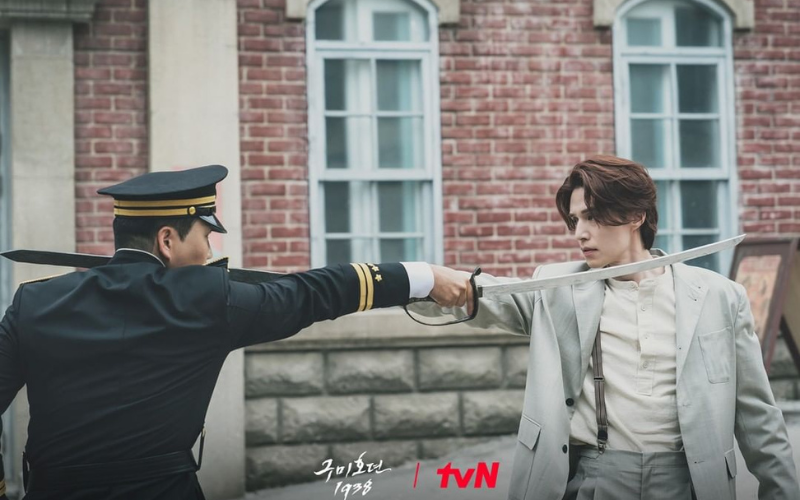- 한국어
- English
- 日本語
- 中文
- العربية
- Español
- Français
- Deutsch
- Pусский
- Tiếng Việt
- Indonesian
By Honorary Reporter Ghada Mohamed Ali from Egypt

Music director Hong Dae-sung (left) and composer Park Seo-hee appear on a promotional poster for "Tale of the Nine Tailed 1938," a K-drama whose soundtrack they composed. (tvN's official Instagram, Hong and Park)
The soundtrack of a K-drama enhances the impact of the work so that the story resonates with viewers. After watching the hit series "Tale of the Nine Tailed 1938," I wanted to learn more about the production of an original soundtrack (OST).
I reached out to Hong Dae-sung, music director and composer of the drama's OST, and co-composer Park Seo-hee. This email interview was conducted from June 12-20.
Briefly introduce yourselves and why you decided to work in this field.
Hong: Due to my Christian background, I grew up listening to classical and church music, and this made me want to become a composer. After graduating from Yonsei University's Department of Composition, I was recruited by music director Jo Yeong-wook, who worked in film scores and had a great impact on my career.
Park: In college I majored in piano performance. I've always loved film and music so I wanted a career in which I could do both. Director Hong has been influential in shaping my musical outlook.
How did you get to work on "Tale of the Nine Tailed 1938?"
Hong: While preparing my debut as an independent composer after leaving Jo's team, I was offered the job after an interview with series director Kang Shin-hyo, whom I met through another music director.
Park: I've been working with Hong as part of his OST team since finishing college and joined him when he took on this project.
What is the process of composing an OST for a K-drama?
Hong: I read the script to get an overall feeling of the piece. Then I use my imagination to envision the scene, which I use as a reference to make the soundtrack from a fresh perspective. After a scene is shot, we add the music but sometimes they don't exactly match, consequently resulting in a lot of trial and error.
Park: To create a score, storytelling is a priority and the music shouldn't get too intrusive. The goal of a piece is to create synergy with the screen by enhancing character expressions and the ups and downs of the plot. That way, viewers get a strong impression of the scene.

This scene is from Episode 5 of "Tale of the Nine Tailed 1938." (tvN's official Instagram account)
What challenges do you face while composing a score?
Hong: Unlike the series' first season, the second has action and fantasy as its genre and barely romance. So we had to write lots of new music with exciting action vibes. We also expressed new monster characters using national instruments and fantasy elements.
Park: Each era requires different musical genres, so we had to compose swing and jazz for the 1930s as well as contemporary for the modern era. We did a lot of research on Korean music and films from the 1930s.
What do you consider the most important element in composing a theme?
Park: The drama is set in ancient, present-day and Japanese-occupied Korea. Each era has its own musical types and devices, and instruments and cultural elements are important for setting the mood for each time. An urban sound is suitable for today's Korea and music from the 1930s for the Japanese colonial period. So using instruments familiar with a given era and place is crucial.
What were your goals in composing this OST?
Hong: We wanted to show that Korea can make a stunning action-fantasy series even with a folk score. We hope that viewers get immersed in this drama through our music.
Park: We also hope that people hum our music and remember the songs.
msjeon22@korea.kr
*This article is written by a Korea.net Honorary Reporter. Our group of Honorary Reporters are from all around the world, and they share with Korea.net their love and passion for all things.